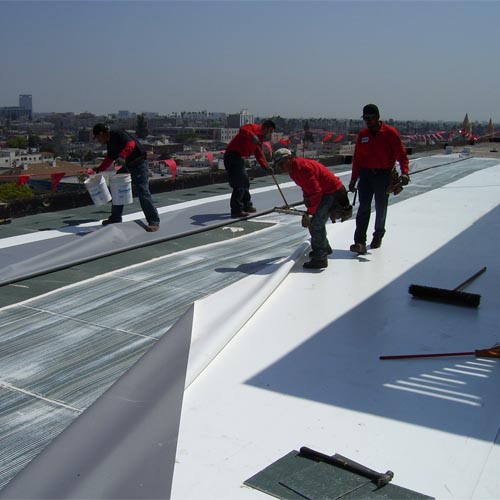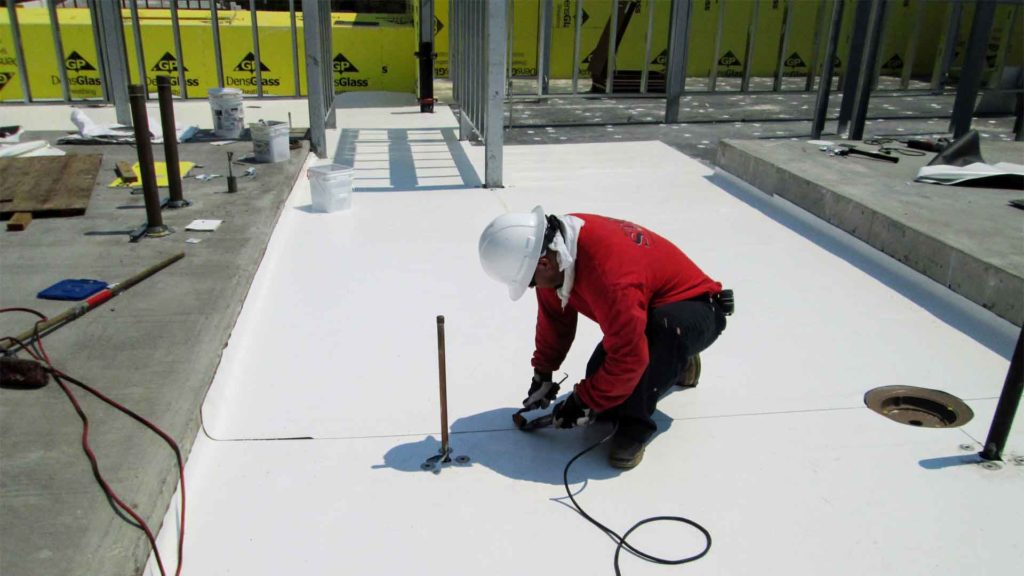Do you have a flat commercial or industrial roof leak in Los Angeles or Southern California? Learn what you need to know about protecting your investment.
In a recent post, we highlighted common flat roofing mistakes you’ll want to avoid. In today’s blog post, we’re digging deeper into the top causes of flat roofing leaks and what you need to know to protect your Los Angeles or Southern California property.
As there is no bigger investment than the one you have in your business, it’s vitally important that you take care of your flat commercial roof, an essential step to protecting all you have invested in your business as well as protecting your valued employees and customers.
A flat roof or low slope roof is a roof that is nearly flat or slightly pitched. As a flat roof doesn’t feature a significant incline, water doesn’t trickle or flow down as it would if you had a more significant slope, making it more prone to roof leaks if proper roofing maintenance isn’t performed.
Below are top causes of flat roof leaks. While many of these issues can be fixed through skilled commercial roof repair, the age of your roof and its overall condition might make a full roof replacement the most cost-effective option to protect your investment
FLAT ROOF LEAK | ROOFING INSTALLATION ISSUES
To effectively prevent leaks, it’s important that roofing materials be properly installed. For potential issues related to installation, you need to hire a skilled professional commercial roofing company to inspect the roof to determine if a roofing repair or replacement is needed.
Note: Any type of roofing repair or installation requires skill, however some materials require installation and roof repair knowledge that only a licensed, experienced commercial roofing professional would have.
DAMAGED ROOFING MATERIALS
Any type of flat commercial or industrial roof can sustain damage that results in leaks. Single-ply roofing, built-up roofing or modified bitumen are all prone to develop leaks after a major incident or impact. Pooling water and wear and tear over time can also result in a roof blistering or cracking.
Punctures or tears in single-membrane TPO or PVC roofing materials may also result in roof leaks, which can generally be repaired with sealant or patches.
PRO TIP: It is crucial to fix damaged roofing materials as soon as possible to prolong a roof’s longevity. Consult with experienced, highly-skilled roofing experts to determine the best approach to commercial roof repair.
LOOSE FLASHING & LOOSE COLLARS
From rain collars to field wraps and pitch pans, any structural components that are routed through a roofing membrane pose a higher risk of leaks. Rain collars are used to deflect water away from open penetrations such as drains, HVAC units or vent pipes. Field wraps, pipe boots and pitch pan components also prevent water from penetrating a roof and structure. Check the condition of these components during regular roof inspections.
PRO TIP:The area surrounding penetrations is usually one of the first places to look for leaks.
A commercial roof may also boast several types of flashing. These protective metal components direct water away from penetrations and can prevent roof damage as an asphalt roof expands and contracts due to changes in temperature. Flashing around the edges of a roof can also prevent high winds from lifting and loosening roofing materials.
Make sure that flashing is in good condition during regular roof inspections and check the fit between the flashing and the roof when searching for leaks.
POOLING & ROOF DRAINAGE ISSUES
Standing water on a roof is the most common underlying factor for leaks. While pooling water may not immediately result in a leak unless roofing materials are damaged, loose or incorrectly installed, water that remains on a roof for longer than 48 hours will eventually wear down materials and can penetrate through seams, flashing or any other breaches. Signs of pooling may be evident immediately after precipitation or in the form of concentric rings of dirt left behind by evaporated water.
The best ways to prevent pooling is to ensure that a flat roof is properly installed, perform regular maintenance and arrange for commercial roof repair.
Flat roofing should not be completely level. A slope of at least a quarter-inch per foot is necessary to direct water toward drainage. Roof drains, scuppers, gutters or downspouts must be kept clear for drainage to function properly. In addition to wearing down materials and raising the risk of leaks, standing water also adds a significant amount of weight to a roof that can cause structural damage.
Clogged Drains
You have a drainage system on your flat roofing system that prevents your roof from turning into a rooftop lake. If you can see standing water on your roof, you need to call an experienced commercial roofer right away. If too much water begins to pool, it can start to leak into your building and cause damage to your property
COMMERCIAL FLAT ROOF WEAR & TEAR
All commercial roofs wear down over time, even with professional roofingmaintenance and repairs. The average lifespan of a built-up roof is about 15 to 20 years, while modified bitumen may last 10 to 20 years. The durability of single-ply materials depends on the composition and design. EPDM, TPO or spray-on roofing can last up to 20 years. A PVC roof may have a lifespan as long as 30 years.
Any roofing material can last longer with regular inspections and timely repairs. Pooling water and an overall lack of maintenance can cause materials to degrade more quickly and result in more leaks throughout the lifespan of a roof. The type of material used may determine the likelihood that leaks will be caused by membrane damage or loose collars, flashing or seams. Any of these problems are better fixed as soon as possible, before water can do damage to the underlying building. Rely on roofing professionals for commercial roof repair and replacement.
When you own a flat-roof, you know that the problems or concerns that you have are unique to commercial roofing. Flat roofs, just like any roof, can leak on occasion. It is important that you have a professional roofer nearby that can assist you when you discover a leak on your commercial roof. Peak Roofing & Construction has extensive experience in repairing leaks on a wide variety of commercial roofs, even flat roofs! Here are a few of the most common reasons we see flat roofs leak.
DAMAGED FLASHING
Because flashing protects some of the most vulnerable parts of your commercial roof, any damage to flashing is cause for concern. The most common reason we see roofs leak is due to damaged perimeter flashing. Along the edges of your flat roof, you may see a smooth covering of flashing that protects the roofing membrane edges from moisture. Over time flashing can become loose or damaged, allowing the roofing cover to get exposed and allowing moisture and water to seep in, causing leaks.
PRO TIP: Perform regular roof inspections and if you see any cracks or peels in your flashing, contact Los Angeles County certified roofing specialists Stone Roofing Company. We can repair your roof flashing before leaks and water cause damage.
STONE ROOF COMPANY | SOUTHERN CALIFORNIA FLAT ROOF REPAIR NEAR ME
When your roof develops a leak or a problem, you will want the assistance of an honest, reliable roofing company. When searching for roofing companies nearby in Los Angeles County, Riverside County, San Diego County, San Bernardino County & Orange County, CA, it is important that you choose the best commercial roofing contractors you can find.
If you have a flat commercial roof and need help with leak detection or roof repair, contact Stone Roofing Company for your free on-site inspection and estimate. Click here or call 1 (800) 31-STONE today to get started.
(888) 429-1213WHY CHOOSE STONE ROOFING?
- Over 80 Years of Commercial Roof Experience
- Attention to Detail & Craftsmanship
- Certified by Every Major Roofing Manufacturers
- Can Repair All Commercial Roof Systems
- Certified by Every Materials Manufacturer
- Fully Licensed and Insured
- Available 24/7-365 Days Per Year
- Full-Time Safety Division
- Friendly & Knowledgeable Technicians & Staff
- Clean & Tidy Service
- Fully-Stocked Vehicles
- All Work is Time Stamped and Photo Documented




